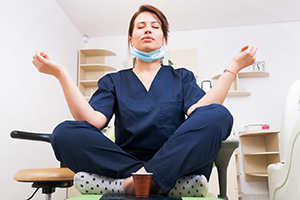 Nearly 36% of Americans have anxiety about dental visits, while 12% experience extreme fear. Childhood trauma or painful dental experiences from the past can be hard to overcome. Even on a good day, people often put off going to the dentist until a tooth starts hurting. About half of those with dental insurance in the United States forgo dental visits and dental work because of cost. But it’s essential to schedule regular dental checkups and professional cleanings to care for your teeth and gums. Especially since your dental health can affect your overall health, including your heart. Review five tips on how to overcome your fear of the dentist.
Nearly 36% of Americans have anxiety about dental visits, while 12% experience extreme fear. Childhood trauma or painful dental experiences from the past can be hard to overcome. Even on a good day, people often put off going to the dentist until a tooth starts hurting. About half of those with dental insurance in the United States forgo dental visits and dental work because of cost. But it’s essential to schedule regular dental checkups and professional cleanings to care for your teeth and gums. Especially since your dental health can affect your overall health, including your heart. Review five tips on how to overcome your fear of the dentist.
1. Understand your fears – If you are anxious about visiting the dentist, you’re not alone. People fear the dentist for these common reasons:
- sounds and smells
- needles and dental tools
- feeling pain from a dental procedure
- cost of procedures (dental insurance can help)
Identifying your fears can make it easier to find solutions to deal with them before visiting the dentist.
2. Select the right dentist – Ask family and friends for recommendations of a gentle and patient dentist. Check reviews of these dentists to find those that match your needs.
- Contact the dental offices to speak with the professionals who will care for your oral health needs. Ask about an in-office meeting and tour.
- Visit each dentist’s website and social media pages to learn more. This may be the easiest way to start researching the office. Read the dentist’s biography, see photos of the office, learn about dental treatment options offered, and find out how long the dentist has been in practice.
3. Ask some questions – When researching potential dental providers, ask questions to make sure you would be comfortable there, such as:
- What to expect during the first visit? How long is the appointment?
- How do they help patients deal with dental fears and anxiety?
- Does the dentist offer anesthesia sedation?
- Will they take a few short breaks if you need to calm your nerves?
- Do they have soothing artwork, aromatherapy, comfortable chairs, weighted blankets, music playing or a therapy dog?
- What are the costs for common dental procedures?
- Do they accept your insurance? (If your insurance has a PPO network, is the dental office in-network? If not, you could pay more for dental care.) How are procedures billed? Do you pay at the time of service? Or does the office bill your insurance?
After the phone call, in-person visit or virtual tour, review the information you’ve gathered to select the right dentist for your needs.
4. Schedule the first visit – Once you’ve chosen a dental office, set up the first appointment. Make sure to arrive early to complete any paperwork. Bring your picture ID, insurance card and payment, if required.
To help ease your fears, it may be helpful to:
- Ask a friend to sit with you during the appointment.
- Wear comfortable clothing.
- Bring along dark glasses in case the dental lights bother your eyes.
- Set up your digital device with soothing music or a favorite show to listen to during the appointment. Bring noise-canceling headphones to block out dental office noises.
- Breathe slowly during the appointment to reduce anxiety. Consider aromatherapy.
- Ask about follow-up appointments. Seeing the dentist twice a year for preventive exams will help you maintain good oral health (and avoid costly dental work in the future).
5. Maintain daily care – In addition to regular dental appointments, there are several things you can do every day to keep your teeth and gums healthy. Following this advice can help keep dental costs and discomfort under control:
- Once a day before brushing, floss between and around teeth to remove debris.
- Brush your teeth two times daily — after breakfast and before bedtime – for two minutes each time. And don’t forget to brush your tongue.
- Use a non-alcohol mouthwash to rinse away food particles. Rinse well, then spit it out in the sink. (Note: mouthwash with alcohol can dry out your mouth.)
Sources and References:
Cleveland Clinic
Healthline
Psychology Today
Value Penguin
Want the latest & greatest from our health blog
straight to your inbox?
Subscribe today for a periodic email with our latest posts.

